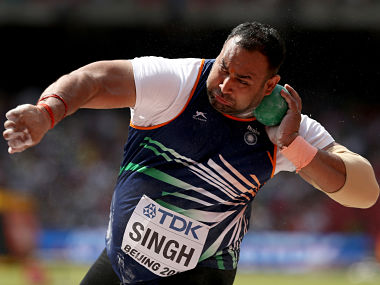Shot putter Inderjeet Singh has been awarded a four-year sanction by the Anti-Doping Disciplinary Panel (ADDP) of the National Anti Doping Agency (NADA) nearly two years after he was provisionally suspended for testing positive for banned substances, Androsterone and Etiocholanone, weeks before the 2016 Olympic Games in Rio de Janeiro. The ADDP had reserved its order upon completion of the hearing on 17 March. In the order passed on Wednesday, the panel held Inderjeet guilty of a rule violation for samples collected in an out-of-competition test in Bhiwani on 22 June 2016 and in the National Inter-State Championship in Hyderabad on 29 June 2016. Inderjeet, who was provisionally suspended on 26 July 2016, will serve the four-year sanction from that date. It remains to be seen if the 29-year-old shot putter, a World University Games champion and an Asian Games 2014 bronze medallist, will prefer an appeal in the complex case. [caption id=“attachment_2404456” align=“alignleft” width=“380”] File image of Inderjeet Singh. AFP[/caption] The burly shot putter’s case is the last of the four high-profile athletes who tested positive in the run-up to the Olympic Games. Wrestler Narsingh Yadav, sprinter Dharambir and quarter-miler Priyanka Panwar have all been sanctioned. Since Dharambir and Priyanka flunked the tests a second time, they are now serving eight-year bans. The Court for Arbitration of Sport handed Narsingh a four-year suspension in Rio after the NADA ADDP declared him not guilty of a rule violation. Inderjeet’s case aroused much interest since the National Dope Testing Laboratory (NDTL) had first declared a sample negative and then reversed its finding. The shot-putter’s lawyer Anish Dayal drew the panel’s focus on the procedural lapses but the ADDP was not convinced that any of these had led to the samples testing positive. The twists and turns in the case included the refusal of the Dope Control Officer and a Junior Analyst at the National Dope Testing Laboratory (NTDL) to depose before the ADDP. The failure of a laboratory equipment during the test meant that the sample being tested had to be stored as an aliquot for nearly a fortnight. The case was heard by an ADDP from January 2017, but it was unable to arrive at a conclusion before its tenure ended in November last year. The NADA panel, chaired by Manik Dogra, resumed hearing the complex case in December last and reserved its order in the third week of March. The panel believed that the two main questions for consideration were whether there were material departures from the international standards during the collection and analysis of the samples, and whether such departures, if any, would result in vitiating the entire testing procedure. While the panel answered the first question in Inderjeet’s favour, it ruled against him in the second. The panel, which included Dr Rana Chengappa and former India hockey captain Jagbir Singh, did not ignore the fact that there were “serious departures” from WADA guidelines during testing. It has suggested that NDTL improve its Standard Operation Procedures so that such lapses do not occur in the future. However, despite such departures from the guidelines, ADDP said that the onus of proving that the deviations have vitiated the testing procedure to such an extent that the result of the tests could be annulled lay with the athlete. A special witness that Inderjeet secured to testify in his favour – a former employee of the NDTL – was unable to swing the arguments his way. Interestingly, the panel included an observation that can become a beacon for the anti-doping proponents and as a lesson for those who keep arguing that an athlete has been tested several times in the past and held a clean record. “The fact that the athlete has previously tested negative for a prohibited substance is not a valid consideration for evaluating the adverse analytical finding (AAF) in the current test. His intent, negligence or otherwise, is secondary and it is for the athlete to disprove the findings of an AAF. Unless the athlete disproves the findings, the presumption is against the athlete,” the order stated. Along with a recent order in discus thrower Arjun Yadav’s case which indicated that NDTL’s testing did not find traces of a banned substance in his sample but the tests in a laboratory in Cologne reported it positive, it can be reckoned that NDTL will come under some pressure from WADA sooner than later to tighten up its procedures and avert any lapses.
Inderjeet, who was provisionally suspended on 26 July 2016, will serve the four-year sanction from that date. It remains to be seen if he will prefer an appeal in the complex case.
Advertisement
End of Article


)

)
)
)
)
)
)
)
)



